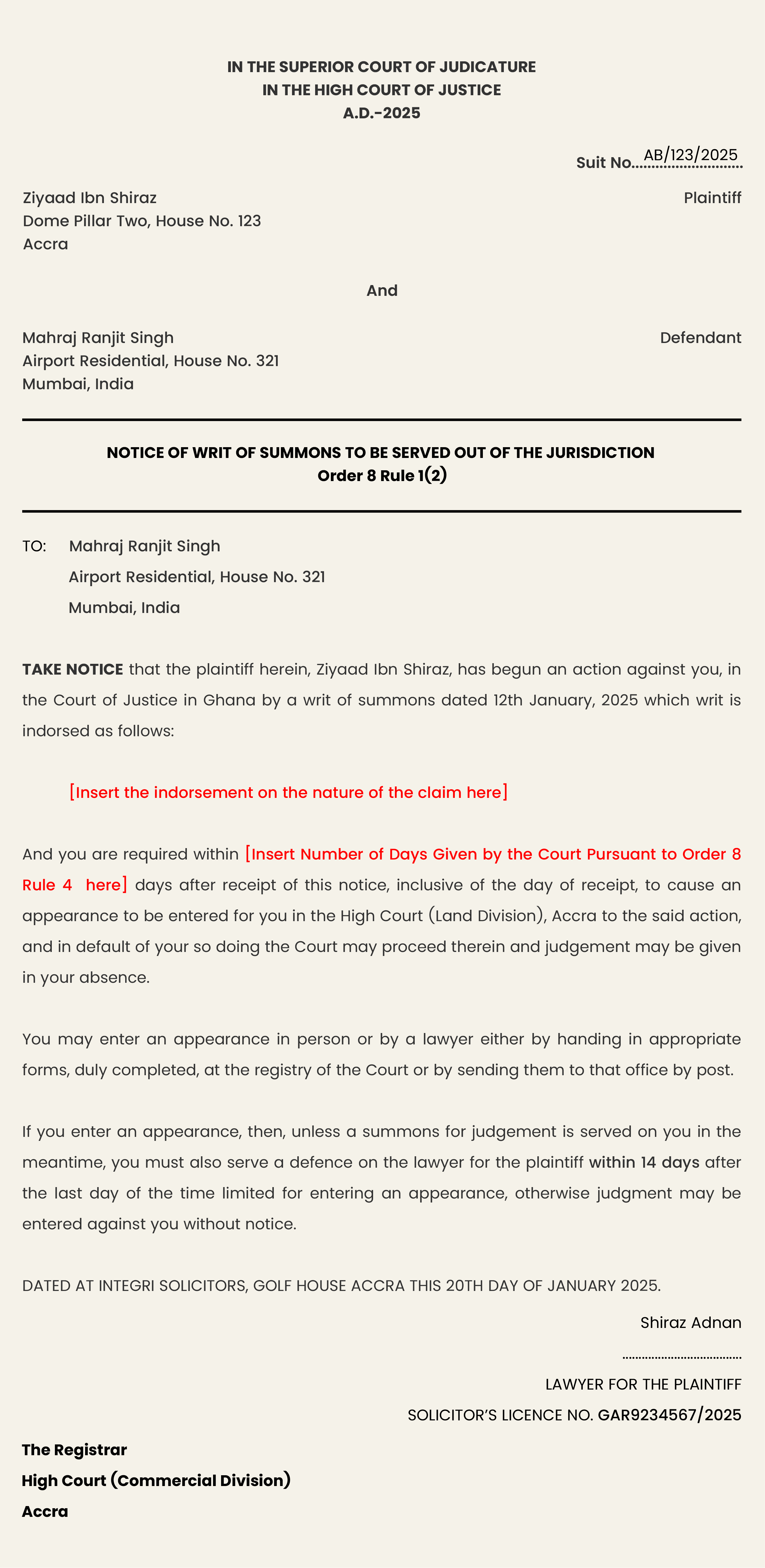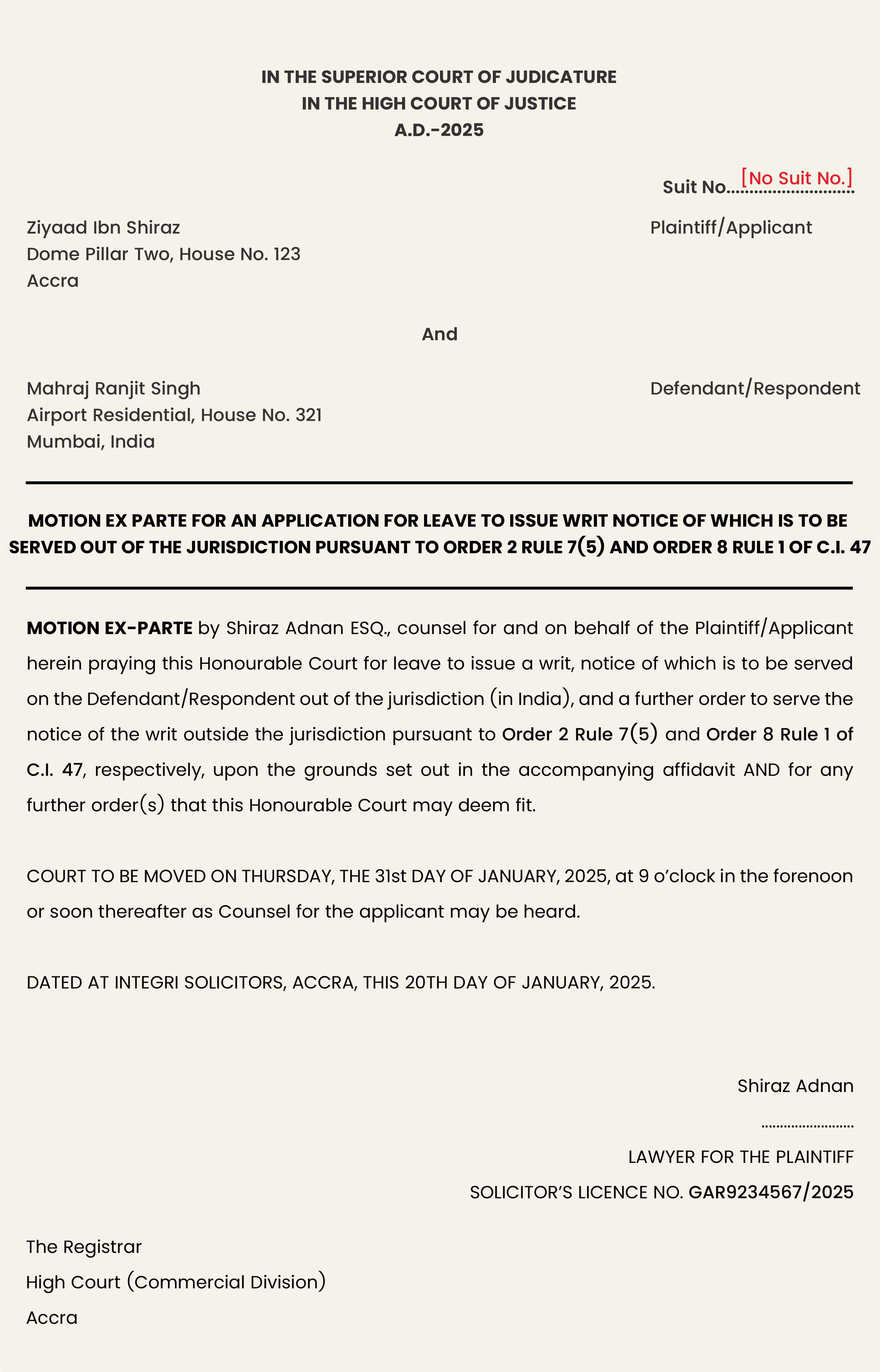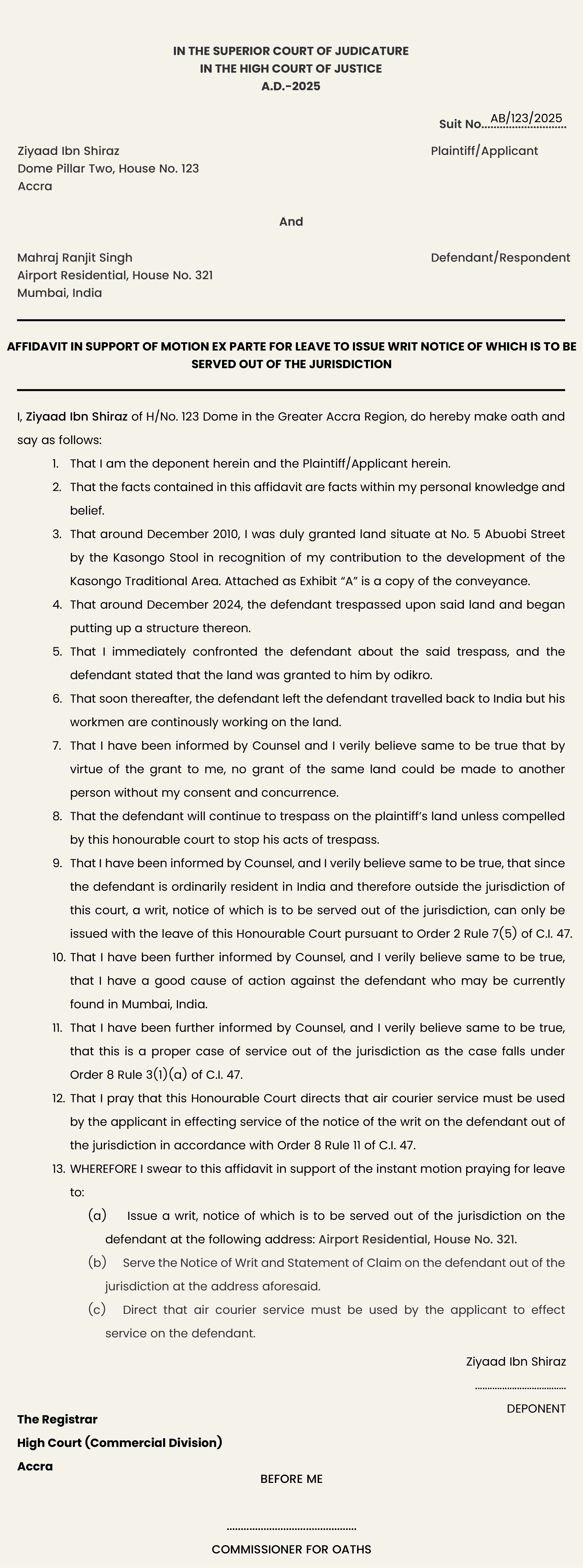Note on Service Out of the Jurisdiction by Legum
Service Out of the Jurisdiction
Introduction:
This note will discuss the meaning of service outside the jurisdiction, the limitations on commencing an action against a person outside the jurisdiction, and the proper way to institute and give notice of an action to a person outside the jurisdiction (outside Ghana).
Meaning of Service Out of the Jurisdiction
This is a service of a process or document outside the territory of Ghana. For example, in an action by a Ghanaian against someone resident in another country, service out of the jurisdiction involves serving the court processes on that person in that other country.
Limits on Commencing an Action Against a Person Outside the Jurisdiction:
If the defendant to an action is outside the jurisdiction, which is Ghana, the High Court (Civil Procedure) Rules, 2004 (C.I. 47) impose the following two main limitations:
1. Leave to Issue a Writ, Notice of which is to be Served Outside the Jurisdiction:
Leave of the court must be sought before a writ is issued against a defendant who is outside the jurisdiction. This is provided in Order 2 Rule 7(5) of C.I. 47, which reads, “No writ, notice of which is to be served out of the jurisdiction, shall be issued without leave of the Court as provided in Order 8.”
If a plaintiff does not obtain leave to issue the writ, the writ will be a nullity. In the case of Lokko and Another v. Lokko [1989-90] 2 GLR 96 , the face of the writ revealed that the defendant was resident in New York and therefore outside the jurisdiction. The defendant contended that the writ was a nullity. The court held that the writ of summons was issued in breach of Order 2 Rule 4 of the High Court (Civil Procedure) Rules, 1954 (L.N. 140A) , which is the equivalent of Order 2 Rule 7(5), and was therefore null. It added that the breach could not be cured by Order 70 of the High Court (Civil Procedure) Rules, 1954 (L.N. 140A) , which is the equivalent of Order 81 of C.I. 47.
Note, however, that the mere fact that the defendant has a foreign address or an address outside the jurisdiction does not mean the writ would be served outside the jurisdiction. If, despite the foreign address, the writ is not intended to be served outside the jurisdiction, then there will be no need to seek leave. In the case of Lokko and Another v. Lokko (supra) , the court delivered itself as follows:
If the defendant has a foreign address it is a very strong indication that the writ of summons is intended for service out of the jurisdiction. But a foreign address per se is not a conclusive indication that the writ would be served outside the jurisdiction. If there is evidence that in spite of the foreign address the writ is not intended to be served out of the jurisdiction then no leave need be sought. An example of such a situation is given in the White Book 1961, Vol. 1 at p. 15 under Order 2, r. 4 of the English Rules of the Supreme Court which is exactly like the Ghana Order 2, r. 4 of L.N. 140A It says:
A writ may be issued against a defendant with a foreign address where it is not intended to serve it out of the jurisdiction; e.g. where the defendant has a solicitor within the jurisdiction who will accept service and undertakes to appear for the defendant.I also believe that if the defendant gives anybody a power of attorney to litigate on her behalf within the territory and who accepts service, etc. it should be regarded as a situation where the defendant has a foreign address, but is not intended to be served outside the jurisdiction. Further, as pointed out in the White Book, such a writ not meant to be served out of the jurisdiction, is stamped with the seal "Not for service out of the jurisdiction." But if it becomes necessary later that the writ be served outside, then a concurrent writ is issued with the usual leave.
2. Only Notice of the Writ, Not the Writ Itself, Can be Served outside the Jurisdiction:
After obtaining leave of the court to issue a writ due to the fact that the defendant is outside the jurisdiction, the writ itself cannot be served outside the jurisdiction (with or without leave). It is only notice of the writ that can be served outside the jurisdiction. This is provided for in Order 8 Rule 1 of C.I. 47 which reads:
(1) No writ shall be served out of the jurisdiction.
(2) Notwithstanding subrule (1), notice of a writ as in Form 3 in the Schedule may be served out of the jurisdiction with leave of the Court .
A notice of a writ is provided in Form 3 in the Schedule of C.I. 47 . This notice informs a person out of the jurisdiction that an action has been commenced against him in a court in Ghana by a writ of summons and statement of claim. Per the provision in subrule 2, notice of the writ can only be served out of the jurisdiction with leave of the court.
Below is a sample notice of a writ:

From the above, the notice of a writ contains the following:
1. The foreign address of the defendant
2. A notice to the defendant that the plaintiff has commenced an action against him by a writ of summons issued on a particular date.
3. The indorsement of the nature of the plaintiff’s claim on the writ of summons. For example, declaration of title to land.
4. Informing the defendant that he is required to enter appearance within a specified number of days provided by the court pursuant to Order 8 Rule 4, and that judgement may be given if he defaults in entering appearance.
5. Another statement informing the defendant on how he may enter appearance.
6. A statement informing the defendant that he must serve a defence on the lawyer for the plaintiff within 14 days.
Sample Application for Leave to Issue Writ and Leave to Serve Notice of the Writ Outside the Jurisdiction:
From the discussion above, you need to draft two applications for leave. These are:
1. An ex-parte application for leave to issue the writ if the defendant is outside the jurisdiction.
2. An ex-parte application for leave to serve notice of the writ outside the jurisdiction.
Although you may draft the above applications for leave separately, in practice, however, these leaves are usually sought in a single application titled:
APPLICATION FOR LEAVE TO ISSUE WRIT NOTICE OF WHICH IS BE SERVED OUT OF THE JURISDICTION PURSUANT TO ORDER 2 RULE 7(5) AND ORDER 8 RULE 1 OF C.I. 47
Per Order 8 Rule 2(1), the application is supported by an affidavit which must contain the following:
i. The grounds on which the application is made.
ii. A statement that in the deponent’s belief, the plaintiff has a good cause of action.
iii. What place or country the defendant is or may be probably found. This must be outside Ghana to justify why the plaintiff is seeking leave.
Below is a sample of an ex-parte application for leave to issue a writ and to serve notice of the writ outside of the jurisdiction, together with the supporting affidavit:
1. Application for Leave

2. Affidavit
 Factors Considered by the Court in Granting Leave to a Plaintiff to Serve Notice of a Writ Out of the Jurisdiction:
Factors Considered by the Court in Granting Leave to a Plaintiff to Serve Notice of a Writ Out of the Jurisdiction: After a plaintiff seeks leave of the court to serve notice of a writ out of the jurisdiction, Order 8(2)(2) provides that the court shall only grant the application if it is satisfied that:
1. The case is a proper one for service out of the jurisdiction. And
2. That the case falls within one of the provisions of rule 3.
In said rule 3, specific cases are provided for when the court may grant leave. Thus, if the plaintiff’s case does not form part of the list of cases, the court will not grant leave. These cases are:
a. Land in Ghana: The subject-matter of the action begun by the writ is immovable property which is situated in Ghana.
b. Instruments Affecting Land in Ghana: The action begun by the writ is for the construction, rectification, setting aside, or enforcement of an act, deed, will, contract, obligation, or relates to liability affecting immovable property within the jurisdiction.
c. Defendant Domiciled or Ordinarily Resident in Ghana: The action begun by the writ seeks relief against a person domiciled or ordinarily resident within the jurisdiction.
d. Administration of Estate of a Deceased Ordinarily Resident in Ghana: The action begun by the writ is for the administration of the estate of a person who died while domiciled within the jurisdiction.
e. Execution of the Trust of a Written Instrument: The action begun by the writ is for the execution, as to property situated within the jurisdiction, of the trusts of a written instrument, being trusts that ought to be executed according to the laws of this country and of which the person to be served with the writ is a trustee, or for any relief or remedy which might be obtained in any such action;
f. Relates to a Contract Made in Ghana, through Agent in Ghana, or Governed by Ghanaian Law: The action begun by the writ is against a defendant who is not domiciled or ordinarily resident in Ghana, but is an action to enforce, rescind, dissolve, annul, or otherwise affect a contract, or to recover damages or obtain relief for a breach of contract which:
- Was made within the jurisdiction.
- Was made by or through an agent trading or residing within the jurisdiction on behalf of a principal trading or residing out of the jurisdiction.
- Is (referring to the contract) governed by the laws of Ghana.
g. Relates to a Breach of Contract in Ghana: The action begun by the writ is against a defendant who is not domiciled or ordinarily resident in Ghana, but is in respect of a breach of a contract within the jurisdiction. The contract may or may not be made out of the jurisdiction, but the breach of that contract must be committed within the jurisdiction;
h. Relates to a Tort Committed in Ghana: The action begun by the writ is founded on a tort committed within the jurisdiction. So, if a person resident outside Gahan falsely imprisons you while they were in Ghana, this case applies.
i. Relates to an Injunction:The action begun by the writ seeks an injunction to order the defendant to refrain from doing something in Ghana.
j. Person out of Jurisdiction is a Necessary Party: The action begun by the writ is brought against a person duly served within the jurisdiction, but a person out of the jurisdiction is a necessary or proper party to it.
k. Terms of Contract Confers Jurisdiction on Ghanaian Court: The action begun by the writ is in respect of a contract which contains a term to the effect that the Court shall have jurisdiction to hear and determine any action in respect of the contract.
Methods of Service Outside the Jurisdiction:
Per Order 8 Rule 6, in serving notice of a writ outside Ghana to another country, one of two things will happen:
- There is a Civil Procedure Convention between Ghana and the country in which the notice of the writ is to be served that provides for service in that country.
- There is no Civil Procedure Convention between Ghana and the country in which the notice of the writ is to be served.
If there is a convention, the notice of the writ may be served in the following modes:
- Through the judicial authorities of that country.
- Through a Ghana consul in that country subject to any provision of a Convention as to the nationality of persons who may be so served.
If there is no convention, the notice of the writ may be served in the following modes:
- Through the government of that country if the Government is willing to effect service.
- Through a Ghana consul in that country, except where service through such an authority is contrary to the laws of that country.
The notice of the writ is sent to the other country through the Ministry of Foreign Affairs. In Order 8 Rule 8, it is provided that:
Documents duly lodged under rule 7 shall be sealed with the seal of the High Court, and the Registrar shall forward them to the Minister for Foreign Affairs with a request that the Minister arranges for the notice of the writ to be served by the method indicated in the request lodged under rule 7 or, where alternative methods are indicated, by the most convenient of the methods.
If the notice of the writ is sent to the other country and served on the defendant, Order 8 Rule 9 provides that an official certificate sent to the Court by the Government or judicial authority of that country or by a Ghana consul in that country, and stating that the document has been served on the person personally or in accordance with the laws of that country on a specified date, shall be evidence of the facts so stated .
In Order 8 Rule 11, however, it is provided that service may be by Airmail. It reads:
The Court, in giving leave to serve a document out of the jurisdiction under this Order, may in an appropriate case direct that airmail shall be used by the party effecting the service.
In Order 82(3), airmail is defined to include international courier service. Example of such courier services are DHL and FedEx.